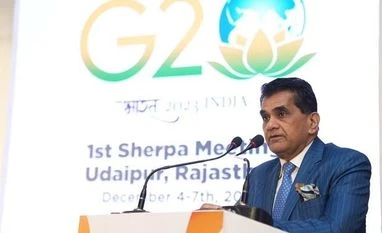New Delhi declaration shows India can be champion of multilateralism: Kant
"The New Delhi leaders' declaration that has come out is very, very inclusive, very ambitious. It has 83 paras in all. This is the first time that all 83 paras have 100% consensus," Kant asserted
)
India's G20 Sherpa Amitabh Kant
Listen to This Article
The New Delhi G20 declaration adopted by leaders has demonstrated India's great ability to be a champion of multilateralism and bring the world together on global developmental issues and conflicts like the Russia-Ukraine crisis, India's G20 Sherpa Amitabh Kant said on Wednesday.
The green development pact, a key part of the declaration, offers a great opportunity for the Indian automotive and components sector to become the global leader in electric and sustainable mobility, he said asking the industry to go all-electric while speaking here at the annual convention of Automotive Component Manufacturers Association of India (ACMA).
"The New Delhi leaders' declaration that has come out is very, very inclusive, very ambitious. It has 83 paras in all. This is the first time that all 83 paras have 100 per cent consensus," Kant asserted.
In the declaration, there is no 'reservation, brackets and chair's summary', he said adding all the 83 paras, including the eight paras on the Russia-Ukraine crisis, have been done by consensus, he added.
"This has demonstrated India's great ability, firstly, to be a champion of multilateralism, and its great ability to bring developing countries, all emerging markets, the developed world, all the G7, Russia, China all together and bring consensus on all developmental issues, as well as on issues of global conflict, which is the Russia-Ukraine crisis," Kant noted.
Also Read
The declaration has a huge focus on climate action, climate finance, and at the heart of it is a green development pact, which has a major implication for the automobile sector, he added.
"I've just negotiated the G20 document and let me tell you, the green development pact has a huge component, the entire negotiation was about cutting down emission by 43 per cent by 2030...and there will be increasing pressure from all over the world on India and other Middle East countries to cut down emissions," Kant noted.
Highlighting India's achievements towards cutting emissions such as exceeding Nationally Determined Contributions (NDC) targets by nine years and initiatives for sustainable mobility, he said,"There is a massive opportunity for India to be really the champion of electric (vehicle) manufacturing in India. We are the champion of the commercial field of two-wheelers, three-wheelers, and many other areas, and we export to the world, but the market is shifting."
Kant said the world is going electric and China has demonstrated it and "India has to go electric".
"My view is that in the immediate run, we will have to go electric with two- wheeler, three-wheeler, four-wheeler and this would require a huge amount of not merely going electric, but it will also require a huge amount of going digital," he said, adding India would also need a technological "pole vaulting to penetrate global markets".
If India has to retain its huge competitive edge as a manufacturer in the automobile sector and components sector, he said,"There is just no other option but to go electric and those who do not go electric will lose the competitive edge, will lose market share and will hugely lose out in the marketplace."
Kant further said,"After all this negotiation of the G20 on green development pact, one thing becomes very clear, and that is there will be a huge push, there will be a huge imperative of global climate change. The world will push us. It's necessary not merely for the world, but for ourselves to do it."
It's imperative for India to push for climate action and lead the initiative to retain its export markets, he added.
(Only the headline and picture of this report may have been reworked by the Business Standard staff; the rest of the content is auto-generated from a syndicated feed.)
More From This Section
Don't miss the most important news and views of the day. Get them on our Telegram channel
First Published: Sep 13 2023 | 12:44 PM IST
